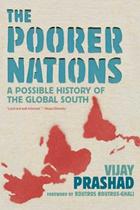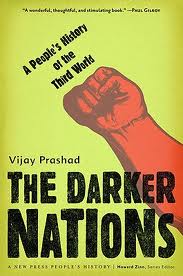Originally published in Capital and Class (37/3)
The Poorer Nations: A Possible History of the Global South
Verso, 2012, 304 pp.
isbn: 978-1844679522 (hbk) £16.99
Reviewed by Alf Gunvald Nilsen, University of Bergen/Norway
With The Poorer Nations: A Possible History of the Global South Vijay Prashad concludes his project of ‘telling the history of the contemporary world (the past hundred years) from the standpoint of the South’ (see Prashad, 2013) – a project that started with his seminal study of the Third World Project, The Darker Nations: A Biography of the Short-Lived Third World (Prashad, 2007). In fact, The Poorer Nations flows from the author’s sense of dissatisfaction with the prequel’s conclusion, which, according to himself, ‘was told in haste and it appeared to be without a dynamic that led any further, it implied that there was no hope for the rejuvenation of a Southern agenda’ (Prashad, 2013).
 This shortcoming is amply rectified in the volume under review, which subjects the decline of the Third World Project as a radical force, its many and contradictory metamorphoses during the 1980s and 1990s, the current rise of the BRICS states, and the proliferation of popular resistance to neoliberalism in the global South to a discerning analysis. Admittedly, Prashad covers a very familiar terrain in this book – the decline of the post-World War II capitalist order, in which market forces were embedded in regimes of state intervention and regulation, and the rise to global hegemony of the neoliberal project. However, it is singularly to his credit that he manages to do so in a genuinely original way, which brings to light aspects of this trajectory that are far too often neglected in the extant Marxist literature on the subject.
This shortcoming is amply rectified in the volume under review, which subjects the decline of the Third World Project as a radical force, its many and contradictory metamorphoses during the 1980s and 1990s, the current rise of the BRICS states, and the proliferation of popular resistance to neoliberalism in the global South to a discerning analysis. Admittedly, Prashad covers a very familiar terrain in this book – the decline of the post-World War II capitalist order, in which market forces were embedded in regimes of state intervention and regulation, and the rise to global hegemony of the neoliberal project. However, it is singularly to his credit that he manages to do so in a genuinely original way, which brings to light aspects of this trajectory that are far too often neglected in the extant Marxist literature on the subject.
Prashad’s point of departure is the unraveling of the Third World Project in the context of the political and economic crisis of post-World War II capitalism – dubbed here ‘Northern Atlantic Liberalism’ (15) – during the 1970s. This was not, Prashad argues, merely the effect of the internal contradictions of the Third World Project – which were dissected and discussed at length in The Darker Nations – but the result of a co-ordinated offensive by the G7 powers to advance a project of neoliberal restructuring. This offensive was multi-pronged: it did not just target the Third World Project, but also the Communist bloc and the remaining vestiges of social democracy in western Europe; it entailed a change of guard in international financial institutions like the World Bank and the IMF, as well as in key United Nations organisations, that witnessed the departure of the Keynesians and the grand entrance of the monetarists; and – perhaps most crucially – it relied on the utilisation of the international debt crisis as lever by which to enforce a new policy regime across large parts of the Global South. This facilitated the reintegration of Southern economies on adverse terms into what Prashad calls ‘the new geography of production’ (4) and thus also the reproduction of Northern hegemony in the world-system. ‘Rather than a South-led New International Economic Order, the world had to live with a North-led International Property Order’ (7).
In many extant accounts of the trajectory of global capitalism, this is normally the point at which the Global South recedes into the background, more often than not cast as the passive victim of the hegemonic projects of transnational elites and the institutions they act in and through. Not so in the case of The Poorer Nations. What we get instead is a detailed narrative of the metamorphoses – and, arguably, transmogrifications – of the Third World Project across the 1980s and 1990s – the ‘lost decades’ of development across substantial swathes of the South. The most innovative and valuable part of this analysis is undoubtedly Prashad’s groundbreaking analysis of the work of the South Commission (1986-1990) under the leadership of Julius Nyerere. The story of the South Commission is one in which persistent ambitions towards progressive change runs up against both the limits imposed by a rapidly changing geopolitical economy and the erosion of Third World solidarity. The outcome was a report that sidelined concerns with equity in favour of the growth imperative, and which singled out the larger nations of the South as ‘locomotives’ that would have ‘to pull along the smaller and less endowed states. Only growth in these locomotives would be able to fire up the rest of the South from its condition of dormancy’ (89).
What this account accomplishes is to render the narrative of the neoliberal counterrevolution in a far more complex and textured way than what has now become standard fare in the literature on global political economy. This narrative is distinctive and valuable becaus of its Southern vantage point, which gives voice to an at times cacophonic and incongruous panoply of voices and visions that otherwise tends made invisible as irrelevant in the big scheme of things. In light of the fact that the frustrated project of the South Commission re-emerged as the G15 in the early 1990s, followed by the IBSA (India, Brazil, South Africa) constellation and ultimately the rise of the BRICS states in the 2000s, the significance of the story that Prashad unravels in the middle-section (chapters 2 and 3) of The Poorer Nations is self-evident.
 In contrast to some – also on the left – Prashad is by no means a cheerleader for the BRICS project. He recognises the significance of the vast increase in global economic salience that underpins the newfound confidence of the BRICS states, but simultaneously points out three decisive weaknesses: 1) the lack of a military platform to challenge NATO dominance; 2) the failure to entrench economic capacities in an alternative institutional infrastructure; and 3) the lack of a distinct ideological alternative to neoliberalism. Whereas the BRICS project cannot be construed as ‘a capitulation to the North’, he argues, it nevertheless amounts to ‘Neoliberalism with Southern Characteristics’ (145). Its discontents are legion, and it is here that Prashad finds hope for a rejuvenated Southern agenda.
In contrast to some – also on the left – Prashad is by no means a cheerleader for the BRICS project. He recognises the significance of the vast increase in global economic salience that underpins the newfound confidence of the BRICS states, but simultaneously points out three decisive weaknesses: 1) the lack of a military platform to challenge NATO dominance; 2) the failure to entrench economic capacities in an alternative institutional infrastructure; and 3) the lack of a distinct ideological alternative to neoliberalism. Whereas the BRICS project cannot be construed as ‘a capitulation to the North’, he argues, it nevertheless amounts to ‘Neoliberalism with Southern Characteristics’ (145). Its discontents are legion, and it is here that Prashad finds hope for a rejuvenated Southern agenda.
In the final chapter of the book, we are thus presented with a sweeping tour through the terrain of popular resistance to neoliberalism in the Global South that spans the IMF riots of the 1980s and 1990s, the emergence of transnational movement networks and the alterglobalisation agenda, Latin America’s Pink Tide, and the sometimes inchoate oppositional projects that are crystallising in the ever-growing ‘slumlands’ (271) of Southern mega-cities. Prashad’s analysis is arguably at its most perceptive when it engages with the Pink Tide in Latin America – the accomplishments and limitations of which are judiciously and critically assessed. However, if I have one quibble with the book, it would be that it fails to engage in equal detail with the forms of popular mobilisation that are emerging in parts of Asia, and particularly in India and China. The weight that India and China carry in the BRICS project would suggest that the future trajectory of struggles against inequality and dispossession in these states are likely to be of the utmost significance. It is therefore somewhat surprising to find that Prashad has relatively little to say about these convulsions.
Everything in perspective, though: this is a quibble, perhaps rooted in the current reviewer’s own interests and orientations more than anything else. The Poorer Nations is an extremely valuable – even pivotal, in many respects – contribution that advances our understanding of the historical trajectory of the Global South on a number of fronts. It deserves a wide readership, both inside and outside academia.
References
Prashad, V. (2007): The Darker Nations: A Biography of the Short-Lived Third World. New Delhi: Leftword Books
Prashad, V. (2012): The Poorer Nations: A Possible History of the Global South. London: Verso
Prashad, V. (2013): “New Texts Out Now: Vijay Prashad, The Poorer Nations: A Possible History of the Global South”, interview available at http://www.jadaliyya.com/pages/index/10653/new-texts-out-now_vijay-prashad-the-poorer-nations.
One thought on “Review of Vijay Prashad’s “The Poorer Nations: A Possible History of the Global South””